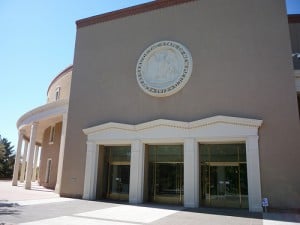
The Roundhouse in Santa Fe (Photo by Peter St. Cyr)
Big campaign contributions from a man whose company won a $30 million investment contract from the state should cause New Mexicans to view Diane Denish with skepticism
Earlier I suggested that Diane Denish is unfit to be governor if she has lacked the courage to point to corruption within the Richardson administration, and say “No” (Albuquerque Journal, July 5). But there are other questions about Denish that linger. One is whether Diane Denish herself has been complicit in corruption, or if not in corruption, in unethical practices. In regard to this second matter consider the following:
In December 2005 a Mr. Leo Hindery Jr., who is a principal in InterMedia Partners, donated $25,381 to Bill Richardson. Five months later, on May 23, 2006, the State Investment Council approved for investment a commitment of $30 million to Mr. Hindery’s InterMedia fund. Thereafter, on June 23, 2006 — a month to the day after the $30 million approval by the State Investment Council — Hindery gave a $25,000 donation to Diane Denish. Later, he gave additional $25,000 donations to both Richardson and to Denish.

Who recommended the investment in InterMedia? A fellow named Saul Meyer.
On April 12, 2006 the state’s Private Equity Investment Advisory Committee (PEIAC) had met with the principals of InterMedia, including Hindery. “Saul Meyer of Aldus Equity Partners was also present and recommended for investment a commitment with (the) InterMedia (fund),” according to the minutes of the meeting. Then PEIAC recommended the $30 million investment in InterMedia to the State Investment Council. And, on May 23, 2006, the council committed that investment, according to the minutes of that meeting.
Why does it matter that Saul Meyer was involved? Well, Saul Meyer recently pleaded guilty in New York State to defrauding the New York State Common Retirement Fund (CRF). Meyer was a founding partner of Aldus Equity and was indicted for paying illegal kickbacks to a politically connected individual who could guide CRF investments to Aldus.
It appears that Myer was playing much the same game in New Mexico. Aldus, his company, also acted as an advisor to our State Investment Council. In his New York guilty plea, Meyer admitted that on numerous occasions, contrary to his fiduciary duty to our State Investment Council, he ensured that Aldus recommended investments that were pushed on him by politically-connected individuals in New Mexico, knowing that these politically-connected individuals or their associates stood to benefit financially or politically from the investments.
So, here you have an example of Richardson and Denish each taking approximately $50,000 in political donations from a fellow who, at approximately the same time, secured for his company a $30 million investment from our State Investment Council. And to boot, you have a recommendation for the investment from Saul Meyer who, in his guilty plea, said that he recommended investments in New Mexico that would benefit politically connected individuals.
Pay to play?
Is this “pay to play” unveiled, evidencing that Denish and Richardson are wrapped in the same corruption package? Perhaps. But, we need more information to know for sure — information which probably can be secured only by law enforcement officials armed with subpoena power.
However, Denish’s taking $25,000 from a man whose company, a month earlier, received a $30 million investment from the State of New Mexico, should cause New Mexicans to view Denish with skepticism.
Because of the evident corruption under this administration related to placement of investment funds, the State Investment Council recently promulgated a “Transparency and Disclosure Policy.” Under that policy, recipients of investments from the council are prohibited from making campaign contributions to elected officials who may have influence over the council. Of course, had the policy been in effect in 2005 and 2006, the donations by Hindery to Richardson and Denish would have been prohibited. But, the rule wasn’t in effect.
However, if this recently promulgated policy by the State Investment Council is a statement of what is considered to be ethical, and what is not, then Ms. Denish had an ethical lapse when she took more than $50,000 from Mr. Hindery, half of which came only a month after the State of New Mexico placed $30 million with Mr. Hindery’s company.
In a recent interview, Diane Denish stated that New Mexicans are looking for “a new day and new way…” The reporter wrote, “Denish is counting on New Mexicans to view her independently from Richardson and whatever questions might linger over his administration” (Michael Coleman, Albuquerque Journal, Dec. 6).
If she were elected governor, perhaps Diane Denish would lead us to a “new day and a new way.” But, then again, maybe not.
Yates is chairman of the Republican Party of New Mexico.